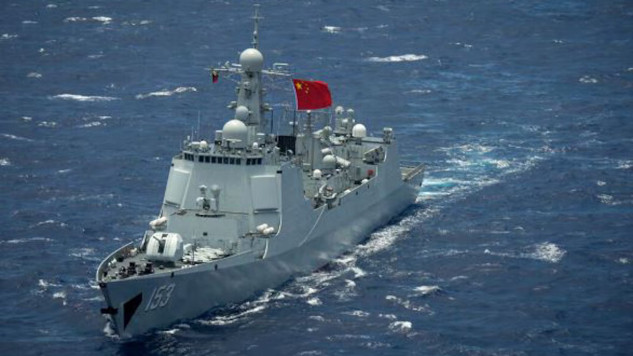
In recent weeks, China’s activities in the South China Sea have raised more concerns in the region. Its ships have collided with Filipino vessels, fired water cannon at others and used sonar pulses close to an Australian ship, injuring its divers.
The United States and its allies view this increasingly assertive behaviour as evidence China seeks to challenge the established maritime order, marking it as a “revisionist” power.
The US and its allies have a fairly straightforward view on the South China Sea. They believe these should be open waters accessible to all states and Southeast Asian countries should be able to enjoy their rights to their exclusive economic zones along their shorelines.
But how does China perceive its rights and legitimacy in governing the South China Sea? And how does it view the broader maritime order? Understanding this viewpoint is crucial to deciphering China’s actions in the ongoing disputes in the sea.
An evolving approach to the South China Sea
China’s approach to disputes in the South China Sea and East China Sea has been guided by the same principle since the country began opening up in the 1980s. The policy, established by former leader Deng Xiaoping, said China would “set aside sovereignty disputes and seek joint development” in the seas.
This principle took as a given Chinese sovereignty over the waters. Chinese policy elites expected other countries would recognise this sovereignty when engaging in joint development projects with China, such as offshore gas fields. Moreover, they insisted participating nations agree to set aside disputes in favour of common interests.
But this approach, seen by Chinese scholars and some within the government as a step back from China’s sovereignty claims in exchange for economic gains, did not yield anticipated results.
In the 2000s, Chinese scholars recognised a growing gap in expectations. They noted that engaging in joint development projects did not necessarily build confidence or create closer ties between China and other claimants to the seas.
They argued other nations had taken advantage of China’s step-back policy to assert their own claims, undermining China’s legitimacy to its own sovereignty over the waters.
The surge in great power competition between China and the US in recent years further complicated the situation. This prompted Beijing to address China’s maritime claims more urgently as public opinion turned increasingly assertive, fuelling resentment of the US over the South China Sea.
China turns more assertive
A significant turning point came in 2012 with a stand-off between the Philippines navy and Chinese fishing vessels in the Scarborough Shoal. The shoal lies about 200 kilometres (124 miles) off the Philippines coast and inside its exclusive economic zone. China seized the shoal and the Philippines launched a case with the Permanent Court of Arbitration.
This marked a shift in Chinese rhetoric about its approach to maritime claims and set the stage for the conflicts we’ve seen in the South China Sea since then.
From the Chinese perspective, it has been essential to reassert the country’s sovereignty and jurisdiction in the region.
To achieve this, Beijing has pursued actions to “rule the sea by law”. This has involved extensive land reclamation projects on atolls (which China was reluctant to do under former leader Hu Jintao), the strengthening of China’s coast guard, regular patrols of the sea, and reforms to domestic maritime laws.
Chinese intellectuals justify these actions based on two principles.
First, they argue China has historic rights to govern much of the South China Sea based on the nine-dash line, making the implementation of domestic laws in the area legitimate.
Second, aligning with the Communist Party’s directive of “ruling the country by law”, these measures ensure clear laws and regulations are in place to govern China’s maritime domain. They strengthen China’s jurisdiction over the contested seas, justifying its steps to build military facilities on islands there.
These activities have been very controversial and have faced international legal challenges. Merely imposing domestic laws and regulations does not automatically legitimise China’s maritime claims and interests.
After China rejected the arbitration tribunal ruling against it in the case brought by the Philippines, the perception in much of the world was that Beijing was violating international laws.
Within China, however, this rejection solidified a consensus among policy elites that the current maritime order was “unfair”.
A ‘fair and reasonable’ maritime order
In response, China has sought to garner international support for its claims and, more broadly, its worldview.
To do this, Beijing has promoted the establishment of a “fair and reasonable” maritime order. China’s 14th Five-Year Plan explicitly outlines this goal in 2021, as part of an overarching goal of creating a maritime “Community of Common Destiny"?
This objective aligns primarily with the party’s view, much trumpeted by President Xi Jinping, of the "rise of the East and decline of the West”. The aim is to shift the existing maritime order from one dominated by the West to one based on what Beijing calls “true multilateralism”.
With its “Community of Common Destiny”, China is promoting itself as a global leader in ocean governance and suggesting what it deems a better alternative. This narrative, according to Beijing, has gained support in the Global South.
Bending rules to its advantage
Western strategists often label China a revisionist force challenging the established international order. However, such a characterisation oversimplifies China’s ambitions in ocean governance.
China does not appear intent on preserving or altering the established order. Instead, Beijing has demonstrated a propensity to bend specific rules within the existing framework to align with its interests, using its institutional influence.
Because these international rules lack a uniform understanding around the world, China is adept at navigating the grey areas.
Ultimately, China aims to dominate the existing maritime governance agreements and treaties, allowing it to impose its own agenda and safeguard its maritime rights and interests. Of course, not all countries view China’s ambitions favourably. The Philippines and Vietnam, in particular, oppose China’s unilateral statements on the South China Sea, perceiving them as assertions of regional hegemony.
I’m not seeking to justify China’s actions here, but rather to provide insight into the internal perspectives driving its actions.
China’s influence in ocean governance is clearly on the rise. Western powers and China’s neighbours need to better understand Beijing’s approach in expanding its maritime interests because future relations in the South China Sea depend on it.![]()
Edward Sing Yue Chan, Postdoctoral Fellow in China Studies, Australian National University
This article is republished from The Conversation under a Creative Commons license. Read the original article.






















